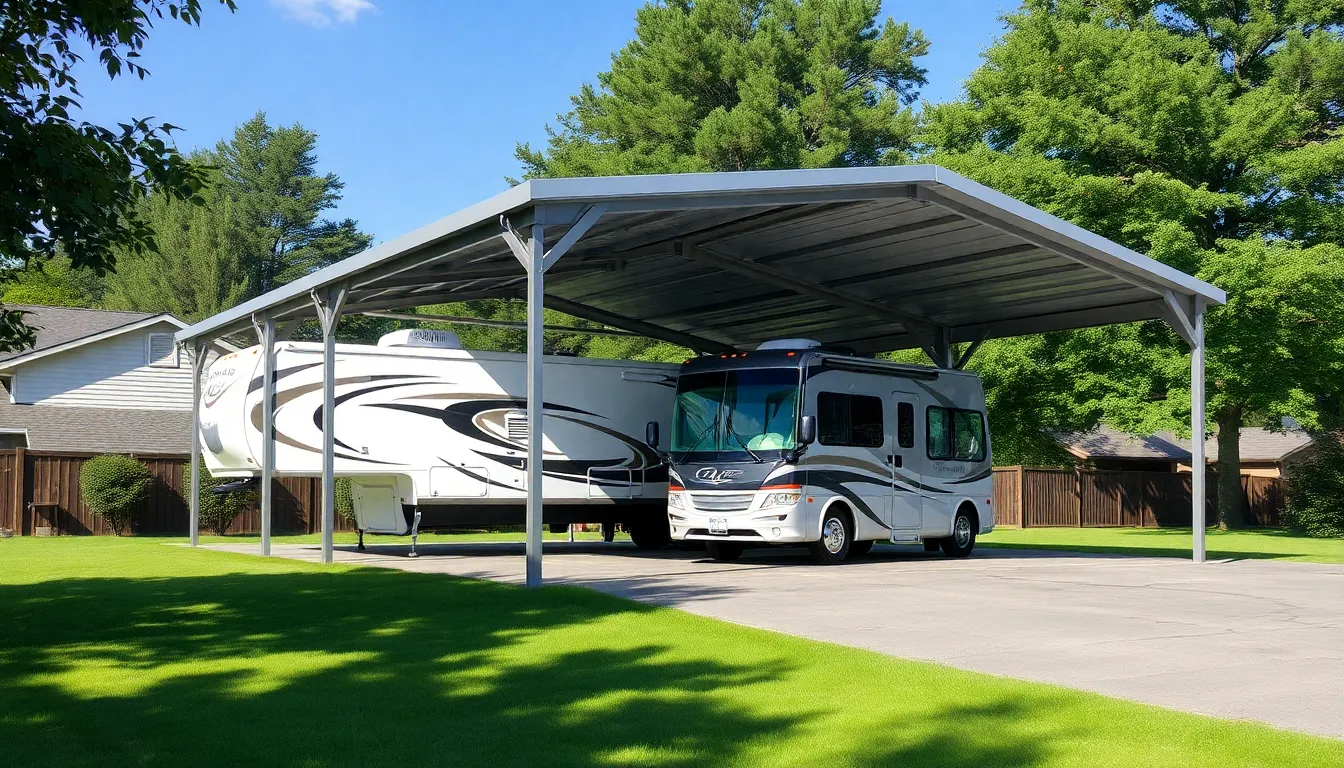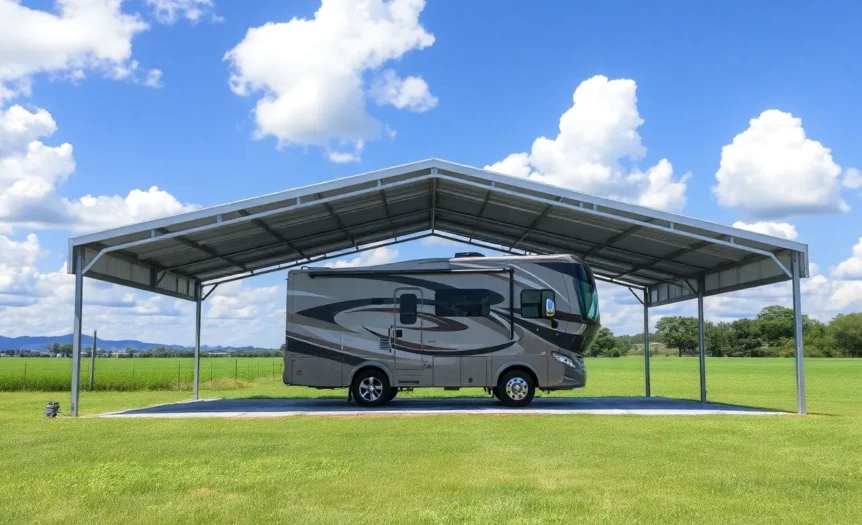Finding the perfect shelter for an RV can feel like hunting for a unicorn in a haystack. With the size of these majestic vehicles, it’s no wonder many owners struggle to keep them safe from the elements. Enter the carport for RVs—a practical solution that combines protection with a touch of style. Not only does it shield the RV from rain, snow, and pesky bird droppings, but it also saves owners from the heartbreak of costly repairs.
Carport for RV
A carport for an RV offers numerous advantages, significantly enhancing vehicle protection and security. These structures provide a reliable solution for keeping RVs safe from various environmental factors.
Protection from Weather
Protection from weather remains one of the core benefits of a carport. Snow accumulation can lead to heavy damage if left unchecked. Rain can initiate rust and mold, causing extensive deterioration over time. UV rays contribute to fading paint and damage interiors, making carports vital in combating these issues. Additionally, carports provide shielding from hail, which can create dents on surfaces. Overall, having a dedicated carport ensures that an RV remains in optimal condition despite fluctuating weather patterns.
Security Features
Security features in carports add another layer of protection. Elevated structures deter potential theft more effectively than open parking areas. Many carports incorporate locking mechanisms or enclosed designs, enhancing safety for RV owners. Surveillance cameras can be installed nearby, offering additional monitoring. Carports also reduce the risk of vandalism due to their secluded nature and elevated visibility. Implementing these features fosters peace of mind, allowing owners to focus on their travels without worrying about their RV’s security.
Types of Carports for RV

Carports for RVs come in various styles and materials, catering to different needs and preferences. Understanding these options helps RV owners make informed decisions about protecting their vehicles.
Attached vs. Detached Carports
Attached carports connect directly to a home or building, offering seamless access to the RV. This design enhances convenience, allowing owners to easily access their vehicles during inclement weather. Detached carports stand alone and provide flexibility in location, often allowing for larger vehicles or multiple RVs. They also offer more space for maintenance and storage. Choosing between attached or detached depends on personal preferences, available space, and intended use.
Material Options
Metal, wood, and fabric serve as the primary material options for carports. Metal carports provide durability and low maintenance, ensuring longevity against harsh weather. Wood carports offer an aesthetic appeal, blending well with natural surroundings while requiring upkeep to maintain structural integrity. Fabric carports deliver lightweight and portable solutions for temporary protection. Each material comes with advantages and disadvantages, so RV owners must consider their needs, budget, and environmental conditions when selecting the best option.
Building Your Own Carport for RV
Creating a carport for an RV involves critical planning and thoughtful design. Owners need to assess available space, desired location, and specific requirements for the vehicle.
Planning and Design Considerations
Planning starts with measuring the RV’s dimensions, including height and width. Site selection plays a vital role in ensuring proper drainage and accessibility. Choosing the right materials is essential, as metal, wood, and fabric each have unique characteristics influencing durability and aesthetic. Design preferences also matter; deciding between an attached structure or a freestanding carport impacts practicality and convenience. Analyzing local building codes ensures compliance with regulations, which prevents future issues.
DIY vs. Professional Installation
Opting for DIY construction offers cost savings but requires knowledge and skills in carpentry or metalwork. DIY builders need to gather tools and materials before starting, which demands time and effort. Professional installation guarantees expert craftsmanship and often includes warranties on work performed. Hiring a contractor simplifies the process, allowing owners to focus on their RV’s upkeep. Weighing both options depends on individual expertise, budget, and desired time frame for completion.
Maintenance Tips for Your RV Carport
Maintaining an RV carport ensures long-lasting protection for the vehicle. Adopting regular maintenance practices helps prevent damage and extend the carport’s lifespan.
Regular Inspections
Regular inspections are crucial for identifying potential problems early. Owners should examine structural components, including the frame, roof, and support beams, at least twice a year. Look for signs of wear such as rust, corrosion, or warping. Inspecting the foundation drains water effectively, reducing structural stress. Checking weatherproofing features, like seals and coatings, also enhances protection. If any issues arise during inspections, addressing them promptly prevents costly repairs down the line.
Cleaning and Upkeep
Cleaning and upkeep keep the RV carport looking its best. Dust, debris, and bird droppings accumulate over time, so a thorough cleaning is essential. Using a soft brush or cloth and a mild detergent helps remove stubborn stains without damaging the surface. Clearing gutters and downspouts prevents water buildup, which can lead to leaks and instability. Treating wood surfaces with preservatives protects against decay, while metal components benefit from rust inhibitors. Regular upkeep not only maintains aesthetic appeal but also ensures functionality remains intact.
Conclusion
Investing in a carport for an RV is a smart choice for any owner looking to protect their vehicle. With various types and materials available there’s a solution that fits every need and budget. Carports not only shield RVs from harsh weather but also enhance security and provide peace of mind.
Proper planning and maintenance are essential to ensure that the carport remains functional and effective over time. By regularly inspecting and caring for the structure owners can extend its lifespan while keeping their RV in optimal condition. Ultimately a carport serves as a valuable investment that safeguards an RV and enhances its overall longevity.


